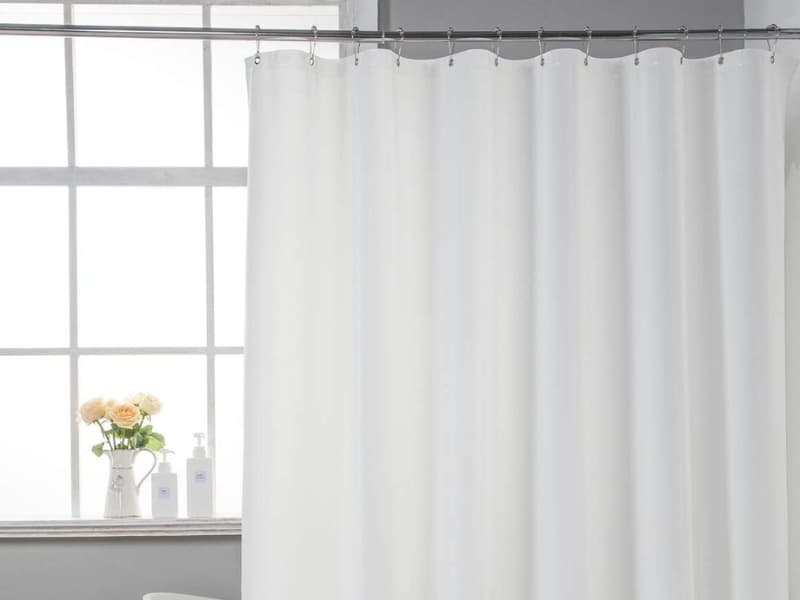The “new plastic” scent you get when you buy a new shower curtain comes from harmful gasses that have accumulated in the packaging and are now being released into the air in your home.
Vinyl shower curtains and those made with PVC materials have been known to cause respiratory and other health issues to users. You should thus avoid them and instead use shower curtains made of hemp, cotton, PEVA, nylon, or no curtains at all.

What makes vinyl shower curtains toxic?
Volatile organic compounds (VOCs), which are generated by PVC shower curtain liners, can harm the liver, kidneys, and central nervous system and induce nausea, headaches, and lack of coordination.
Eye irritation, nose and throat pain, breathing issues, allergic skin reactions, headaches, nausea, vomiting, exhaustion, disorientation, and nosebleeds are the most typical symptoms associated with exposure to VOCs.
However, not all vinyl shower curtains are harmful. Vinyl is combined with several different chemicals to make a variety of compounds. The cause is polyvinyl chloride (PVC), sometimes known as Plastic Poison. PVC is frequently described as “vinyl” on the packaging, which adds to the situation’s complexity.
As a general guideline, avoid purchasing a shower curtain unless you are certain it is not made of PVC.
Non-toxic alternatives to vinyl curtains
Relatively inexpensive shower curtains are typically constructed of synthetic materials rather than natural ones. We now know that harmful substances can be found in our shower curtains and clothing. We’ll go over each type of material you can use as a shower curtain.
1. Hemp curtains
One of the greatest options for a non-toxic shower curtain is hemp fabric. Hemp is a plant that grows quickly, doesn’t need fertilizers or a lot of water, and has the added benefit of aerating the soil thanks to its extensive root system.
Wax can also be added to make it water-resistant. Shower curtains made of tightly woven hemp won’t let water through.
This makes them the best non-toxic shower curtain that is biodegradable at the end of their existence because they do not need any vinyl liner to make them watertight. Additionally, hemp naturally resists mildew.
2. Organic cotton curtains
The second-best substitute for non-toxic shower curtains is cotton drapes. Although they are not as water-resistant as their rival, the hemp curtain, they can still be a good shower curtain if they are well-made and tightly woven.
Because of how substantial the material is, they won’t wrap around you in the shower as most plastic shower curtains do. Cotton, however, is susceptible to stains and is not mildew-resistant. As such, you could see mold on the bathroom ceiling if you use cotton shower curtains.
3. Shower drapes made of PEVA
Another form of plastic utilized in numerous everyday household items, like tablecloths and children’s toys, is called PEVA. Peva was developed as a “healthier” alternative to PVC because it is not manufactured with chlorine.
Due to its durability, water resistance, and ease of cleaning, it is a good choice for a shower curtain. But is it safe for both the environment and the person?
What is certain is that this substance is phthalate free. However, PEVA, or polyethene vinyl acetate, should not be utilized around living things. It negatively impacts human health and is not a suitable replacement for PVC. Therefore, I would avoid using PEVA curtains.
4. Nylon curtains
Although some businesses employ chemicals to better waterproof the curtains, nylon is still a relatively affordable alternative for shower curtains. In addition, washing your nylon shower curtain increases the amount of microplastic pollution because it is not biodegradable.
5. No curtains
How about a complete lack of shower curtains?
This depends on how your bathroom is set up. Why not entirely skip the hassle of shower curtains if you have an open shower and it is simple to swing a mop through once you are finished showering?
As a substitute, you might restructure the way your shower is constructed and use a portion of the wall to stop the water from running off somewhere.
Alternatively, glass shower doors could be installed in place of a shower curtain. These are simple to install (if you have some prior experience with DIY) and have wonderful looks. If all else fails, ask a helpful neighbor or a contractor to put the glass panels in your shower.
Some individuals hang up their shower curtains and turn on a fan to get rid of the odor, while others hang their curtains outside in the open air. This is helpful, but many chemical gasses take days, weeks, or even longer to be discovered. It’s not a good idea to wash the shower curtain because heat and chemicals could cause toxins to be released more quickly.
Conclusion
A sustainable shower curtain shouldn’t emit any chemicals, and even the process of making them should be open to the public and simple to understand. It is best to steer clear of a company if you can’t easily uncover its sustainability policies.
To avoid mold growth, properly air-dry your curtains and let the sun work magic. For example, let the bathroom air out after a shower or bath so the shower curtain can finish drying completely. This is another simple but important tip for extending the life of your shower curtain.
Additionally, PVC shower curtains must be banned. Although less harmful, PEVA shower curtains are still not very good. When ready to replace your shower curtain, choose one made of organic cotton, linen, or natural hemp instead!
